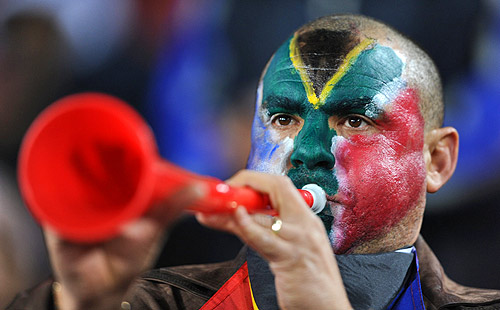
For the past week millions of households across the UK, or even the world for that matter, could have been forgiven for thinking that a swarm of bees had nestled in the back of their TV sets while they watched the World Cup. This has consequently put a sting in the tail of the British public, who have found this incessant droning quite irritating, and made the competition not as entertaining as they’d hoped.
However, as we all discovered, it was not a giant frenzy of bees hidden inside the stadium, it was a mass of people playing an African horn called a vuvuzela. I mean, I had heard of them before the tournament started but did I think you’d be able to hear them right throughout the match?! No, is the answer. Neither did I think they’d cause so much controversy that a request was sent to FIFA to get them banned, although this was declined.
Most people can’t stand the noise, my mum and sister included, and it would be so easy to agree with them. I have to admit it’s not the most pleasant of sounds, and if you’re like me who aims to watch most of the matches, it threatens to make your viewing of the World Cup pretty tedious. It also gives my mum some ammunition to convince me that the Coronation Street theme tune would be much better to listen to in the evenings, however I’ve started to forget the vuvuzelas are even there.
I’m all for tradition as well, and if this is how South Africa expresses itself throughout football matches, then let them. This is the first World Cup on African soil, so we’re bound to experience something new and different during matches. Even though you may not be able to hear fans chanting throughout World Cup matches, I think the vuvuzela adds a new dimension to the atmosphere.
Anyway, what are us Brits complaining about?! Thousands of us have already bought the plastic version that has been exported over here, and are quite happy to test it out in our homes and on the streets. Even my good friend Lou magically found one lurking in her house, so who knows, you may also find a vuvuzela under your stairs or in your garden shed.
The vuvuzelas have also given us an opportunity to crack endless jokes at our own nations expense. After the game against Algeria, lots of quips surfaced, some of my favourites being, “That’s not vuvuzelas, that’s the grass snoring”; or, “That’s not vuvuzelas, that’s the sound of a whole nation booing”. So, the vuvuzelas in a sense have given us some comedic relief from England’s poor performances on the pitch.
It seems that slowly everyone is warming to the African horn, and hopefully this World Cup will be remembered for the right reasons on the field, and not just for that annoying noise that got on everyones nerves.
We’ve spent enough time blowing our own trumpets about England’s World Cup chances, so why not let Africa blow theirs?

